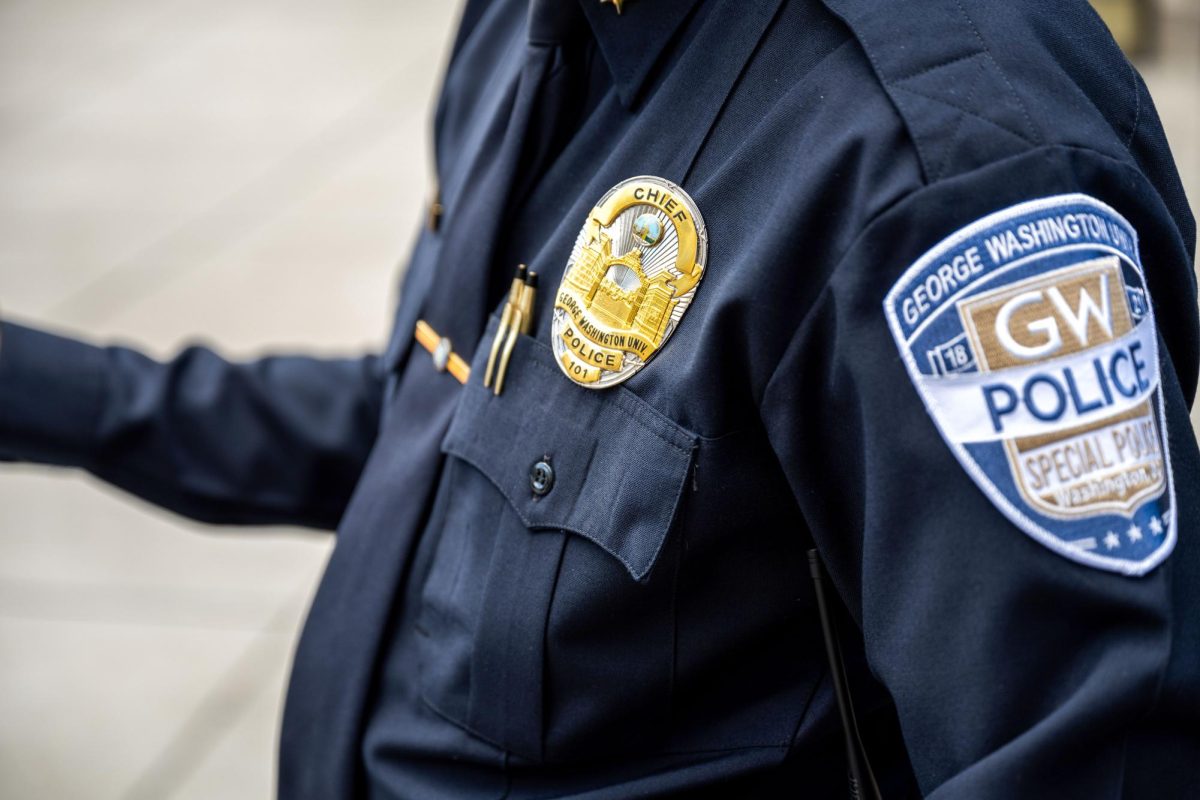The GW Police Department is struggling to fill police officer roles amid a regional and national trend of fewer applicants with less experience in the years following the killing of George Floyd in 2020.
GWPD Chief James Tate said last week that his department plans to hire three supervisors in the coming weeks to fill officer vacancies. He said recruiting for the department is much more difficult today than it was in previous years, mainly because the caliber of applicant pools is diminishing as applicants’ education and experience levels decline.
“I can tell you that it’s something not felt by just us, it’s felt by police departments all over the country,” Tate said.
In 2023, the number of officers in the Metropolitan Police Department, which serves the D.C. area, shrank to a 50-year low. MPD’s attempts to recruit new hires have reached as far as New York City, where MPD placed ads on buses and subways as early as 2022 to recruit local officers to join the D.C. force. Officer retirements also increased by 45 percent between 2020 and 2021, according to research on nearly 200 law enforcement agencies.
Tate said police chiefs are now more reluctant to hire from the applicant pool because they want to avoid adding officers who could pose a liability.
“We want to reduce any sort of risk of bringing someone on who has made some serious mistakes,” Tate said.
Current and former police from other agencies and schools said as public opinion toward law enforcement has declined, fewer people are applying for jobs in the field, leading to overall diminished candidate quality.
Daniel Dusseau, the retired chief of police and former director of public safety for Northern Virginia Community College, said public scrutiny on law enforcement officers and better pay rate offerings from other police department positions may turn away potential recruits from campus policing roles.
On average, a campus police officer in D.C. makes approximately $79,648 per year. The annual salary for MPD officers starts at $66,419, increasing to $72,668 after 18 months and $88,327 after five years.
Dusseau said the 2020 killing of George Floyd increased scrutiny on law enforcement.
“It made it harder for people to want to stay when they felt like everything they did was being scrutinized no matter what decision they made,” Dusseau said.
Dusseau said D.C. campus police departments struggle to recruit officers because they have to compete with District-area departments to recruit the same limited pool of potential candidates.
“They’re looking for somebody with a service mentality, clean background, who’s a problem solver and empathetic,” Dusseau said.
He said campus police officers have two duties: developing relationships with students they regularly see on campus and holding them accountable for their misconduct. Dusseau said campus police enforce university policies and regional laws, and must understand the culture of the campuses they serve.
“They’ve got to really do that deep dive and understand the culture that’s there and intertwine themselves in all the different things,” Dusseau said. “And then it can be a win-win.”
Carlos Kelly, the chief of police at the University of the District of Columbia, said he is actively hiring for seven vacant positions. He said he anticipates hiring five new officers and two new dispatchers in May, with an additional four officers to be hired this summer to become fully staffed by the start of the fall term.
He said some potential applicants are attracted to the “action” at an urban police department, deterring them from campus roles, which receive fewer calls for service.
“My philosophy is a student-centered approach to policing,” Kelly said in an email. “Community policing in every aspect of the job. When you interact with the client or the community in which you serve your actions should always be what’s in the best interest of the student.”
Bill Webster, the captain of the administrative bureau for the University of Southern California Department of Public Safety, said his police force has 29 vacancies out of 112 armed officer positions.
Webster, who has worked at USC for the past decade, said there have always been campus police officer vacancies during his time at the university, but the number of vacancies significantly increased in the last two or three years.
He said he does not think there is less interest in becoming a campus police officer compared to a standard member of law enforcement, but that the issue spans across law enforcement because people perceive the industry negatively and with “an increased level of hostility.”
“In general, law enforcement careers are not considered attractive,” Webster said in an email.
Peter Moskos, a former police officer and professor of criminal justice at the John Jay College of Criminal Justice, said the perception of a lack of prestige among campus police, compared to city policing, deters applicants from the job.
“In some ways, recruitment problems aren’t new but the magnitude of it has become much greater,” Moskos said. “It relates to campus police because there’s some but there are very few people that would choose to be a campus cop over a regular cop.”
Moskos said he spoke to police officers who observed that the lack of applicants leads to the declining quality of employed officers.
“The applicant pool is smaller,” Moskos said. “Of course, standards get lowered because you still need to hire people, and at some point, you’ll let someone in who you wouldn’t have back when you had more people to pick from.”





